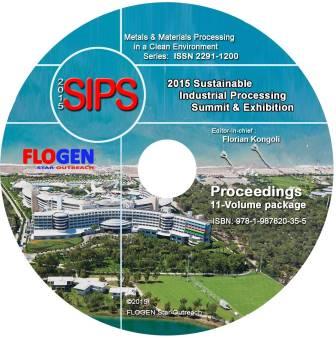2015-Sustainable Industrial Processing Summit
SIPS 2015 Volume 3: Takano Intl. Symp. / Metals & Alloys Processing
| Editors: | Kongoli F, Noldin JH, Mourao MB, Tschiptschin AP, D'Abreu JC |
| Publisher: | Flogen Star OUTREACH |
| Publication Year: | 2015 |
| Pages: | 550 pages |
| ISBN: | 978-1-987820-26-3 |
| ISSN: | 2291-1227 (Metals and Materials Processing in a Clean Environment Series) |

< CD shopping page
Self-Propagating High-Temperature Synthesis of Advanced Materials
Seref Sonmez1; Onuralp Yucel1;1ISTANBUL TECHNICAL UNIVERSITY, Istanbul, Turkey;
Type of Paper: General Plenary
Id Paper: 456
Topic: 42
Abstract:
Self-Propagating High Temperature Synthesis (SHS, combustion synthesis) process is an energy and cost saving processing method for the synthesis of a wide variety of materials, including intermetallics, carbides, borides, silicides, oxides, nitrides etc, organics, as well as their composites or in form of their protective coatings. In the SHS process, after initiation, highly exothermic reaction becomes self-sustaining and propagates along the SHS mixture producing the desired product. For a SHS process, adiabatic combustion temperature (Tad) value dictates whether the reaction can self-propagate or not. It has been empirically suggested that a combustion reaction will become self-sustaining one when Tad ≥ 1800 K. Preferably, the combustion temperature (Tad) of the mixtures is selected between 2000–3500K. High exothermic initial mixtures of metals or metal oxides with metals and nonmetals are used for SHS. The control of process parameters (combustion temperature and combustion velocity), chemical and phase compositions, macro- and a microstructure of SHS products and also their properties are realized with the help of a variation of initial mixture composition, particle size of reagents and other external influences. This study aimed to establish a scientific and engineering background in the production of advanced materials via SHS which is a novel process technique regarding fast and low-cost production ability. The principles and methods of processes were investigated.